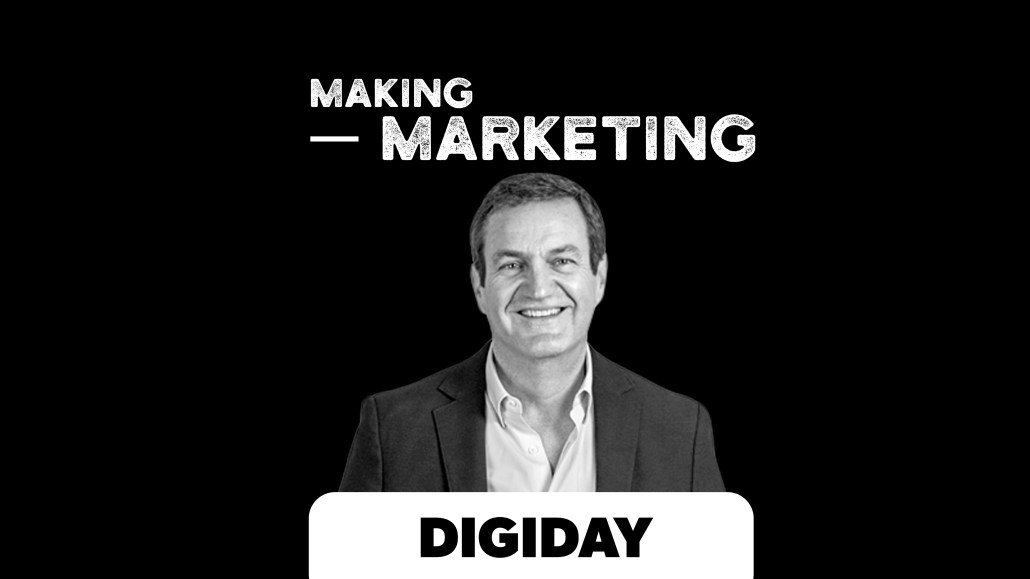Deutsch’s Mike Sheldon: The advertising agency business is not growing

Subscribe: iTunes | Google Play | Stitcher | RSS | Anchor
The big shift in this year has been in the marketers’ demands from an agency. It’s not just about the advertising anymore. Agencies are increasingly being called on to solve business problems — and it’s showing. Mike Sheldon, Chairman and CEO of Deutsch North America has witnessed exactly that in pitch meetings.
“We were in a pitch meeting and they didn’t want to hear anything about us,” said Sheldon on this week’s episode of Digiday’s Making Marketing. “We spent 10 minutes on creative and the rest was on business-building, analytics, how to get further upstream, how the startup could position their business to launch. Little was about old-fashioned TV spots or our ability to crack the code in the creative world. You feel that more and more in the creative world. The idea of being in advertising is more about business-building.”
Sheldon discusses learning new skills, the allure of consultancies and in-house agencies and more consolidation in 2019 on this episode.
Everyone wants to offer all the skills and services.
“Everybody’s rushing to the middle. Managing, hiring and training creative people is what we’re good at. The other side of it is exciting and doable, which is getting the right people who are good strategists and consultants. That is the conversation with the CMO today. There will always be a role in the world for a business builder. The smarter you are about it, the more money you make.”
Agencies don’t know as much about the business as before.
“When I started out in the industry, we were much deeper into the client’s business. If you were in advertising and working for soft drinks or financial services, you knew all the numbers. I used to train new brand managers at our client partners. Then we got marginalized along the way, more clients took the work in-house and didn’t want the agency to have that much data. But now it’s coming back, at least to the agencies who are making it come back. Because without that, we lose a piece of the pie we shouldn’t be losing and we aren’t a part of the conversations that we should be involved in. [It was happening because] the senior executives would ask the marketer why the agencies know more about our business than they do. The sentiment was [to] let the agencies make ads and marketers will know what they need to know about the business.”
The advertising business is not growing, but opportunities are
“The advertising agency business is not growing overall. For us to make sure that we are future-proofing ourselves and are relevant and robust and a much bigger agency five years from today, we have to have more pieces of that pie. That’s why we got really deep into digital 10 or 15 years ago so we could make enterprise level websites because we didn’t want that revenue to go away. Now we’re deep into social or AI. It’s about staying ahead and investing ahead of your revenue because if you don’t have the service, you won’t be able to grow the business.”
The argument for in-house agencies can make sense in some cases.
“If marketers have really incredible internal talent, then yes, I’m nervous about [in-house agencies] because that’s the way to go. But I don’t always see that being the case. You might be able to pick up savings but you might miss that outside objectivity. We’re in fear of losing an account every day and that fear or paranoia keeps you working and pushing. When you’re a vendor, it’s different from being internal. Clients recognize that.”
More in Marketing

Agencies create specialist units to help marketers’ solve for AI search gatekeepers
Wpromote, Kepler and Jellyfish practices aim to illuminate impact of black box LLMs’ understanding of brands search and social efforts.

What AI startup Cluely gets — and ad tech forgets — about attention
Cluely launched a narrative before it launched a tool. And somehow, it’s working.

Ad Tech Briefing: Start-ups are now table stakes for the future of ad tech
Scaled ad tech companies need to maintain relationships with startups, when the sector is experiencing ongoing disruption due to AI.








